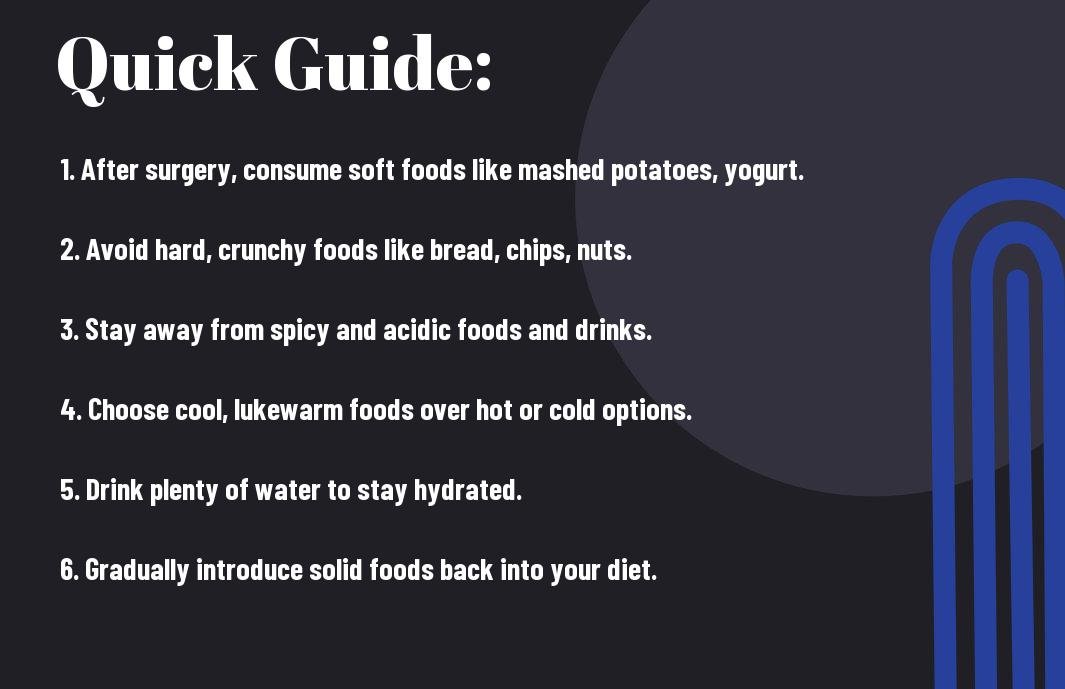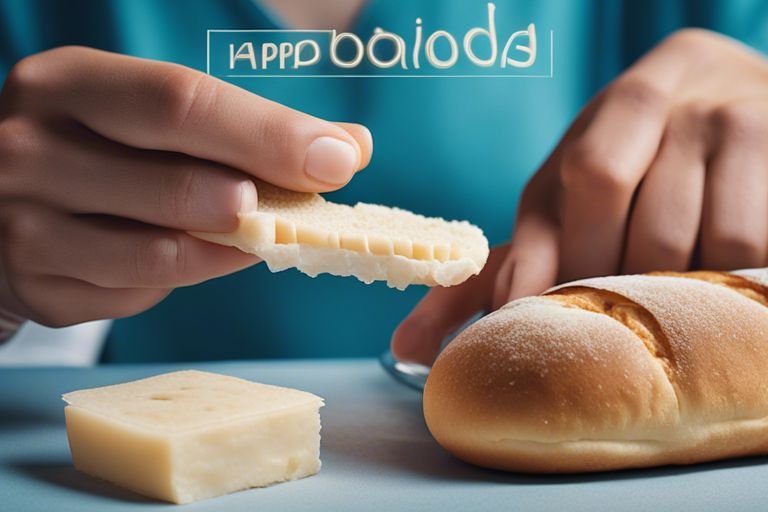Experiencing the extraction of wisdom teeth can be a painful and uncomfortable process, and it’s important to be aware of the foods and drinks that can either aid or hinder the healing process. As someone who has recently undergone this procedure, I know firsthand the challenges of finding the right foods to eat. While you may be craving your favorite comfort foods, it’s crucial to avoid certain foods and drinks that can worsen the pain and potentially cause complications. On the other hand, choosing the right foods and drinks can help speed up the healing process and alleviate discomfort. In this guide, I will provide you with essential tips on what to eat and what to avoid after wisdom teeth removal, including whether or not you can eat bread and other important dietary considerations.
Key Takeaways:
- Soft and easy-to-chew foods are recommended after wisdom teeth removal to avoid irritating the surgical site and aid in the healing process.
- Avoid hard, crunchy, or sticky foods that may dislodge the blood clot or cause discomfort during the recovery period.
- Bread can be consumed after wisdom teeth removal as long as it is soft and not too crusty, which can be difficult to chew and may cause irritation to the extraction site.
- It is important to stay hydrated after wisdom teeth removal, but it is best to avoid drinking through a straw to prevent dislodging the blood clot and causing complications.
- Following the post-operative dietary guidelines provided by your dentist or oral surgeon is crucial in ensuring a smooth and successful recovery after wisdom teeth removal.
Types of Foods and Drinks to Avoid After Wisdom Teeth Removal
Before I dive into the specific types of foods and drinks to avoid after wisdom teeth removal, let me emphasize the importance of following your dentist’s post-operative care instructions. This is crucial for preventing complications and promoting proper healing. Here are the types of foods and drinks you should avoid:
| Hard and Crunchy Foods | Spicy Foods |
| Carbonated Drinks | Hot Drinks |
| Alcoholic Beverages |
Hard and Crunchy Foods
After wisdom teeth removal, it’s crucial to avoid hard and crunchy foods that can irritate the surgical site, dislodge blood clots, or cause trauma to the area. Foods such as nuts, chips, and hard candies should be avoided. Opt for softer foods that require minimal chewing to avoid any potential damage to the extraction site.
Spicy Foods
Spicy foods can irritate the surgical site and cause discomfort during the healing process. The consumption of these foods can lead to a burning sensation and increased pain in the extraction area. It’s best to avoid spicy foods until you have fully recovered to prevent any unnecessary discomfort.
Carbonated Drinks
Carbonated drinks such as soda can be harmful to the surgical site due to their carbonation and acidity. The carbonation can dislodge blood clots and cause irritation, while the acidity can delay the healing process. It’s best to avoid these drinks and opt for water or other non-carbonated beverages instead.
Tips for Eating After Wisdom Teeth Extraction
One of the most important things to remember after wisdom tooth extraction is to be mindful of what you eat and how you eat it. Here are some tips to help you navigate the post-extraction diet:
- Stick to soft foods for the first few days.
- Avoid using a straw to drink liquids.
- Chew slowly and be mindful of your chewing technique.
Assume that following these tips will help you avoid complications and promote healing.
Soft Foods to Consume
After wisdom teeth extraction, it is important to consume soft foods that require minimal chewing. Foods such as applesauce, yogurt, mashed potatoes, pudding, and smoothies are great options during the initial days of recovery. These foods are easy to eat and won’t put any strain on your healing extraction sites.
Using a Straw Carefully
While it may be tempting to use a straw to drink liquids after wisdom tooth extraction, it is best to avoid using one. The suction created when using a straw can dislodge the blood clot that forms in the extraction site, leading to a painful condition called dry socket. It is best to carefully sip your drinks from a cup instead.
Chewing Slowly
When you do start incorporating more solid foods into your diet after wisdom tooth extraction, it is important to chew slowly and be mindful of your chewing technique. Chewing on the side opposite the extraction site can help prevent any irritation or injury to the healing area. Additionally, cutting your food into smaller, more manageable pieces can make chewing more comfortable and minimize the risk of complications.
Step-by-Step Guide to a Smooth Recovery
To ensure a smooth and speedy recovery after wisdom tooth extraction, it is crucial to follow the proper post-operative care. Here is a step-by-step guide to help you navigate through the recovery process:
| Immediate Post-Extraction Period | Days 1-3 After Surgery |
|---|---|
| Apply gauze to the extraction site to control bleeding. | Avoid vigorous rinsing, spitting, or using a straw. |
| Rest and avoid physical activities for the first 24 hours. | Eat soft foods and consume plenty of fluids. |
| Avoid touching the surgical site with your fingers or tongue. | Take prescribed pain medications as directed. |
Immediate Post-Extraction Period
During the immediate post-extraction period, it is important to control bleeding and minimize the risk of infection. Apply gauze to the extraction site and bite down gently to help reduce bleeding. Avoid touching the surgical site with your fingers or tongue to prevent irritation or contamination. Rest and avoid physical activities for the first 24 hours to facilitate the healing process.
Days 1-3 After Surgery
During the first three days after surgery, it is essential to follow specific guidelines for a smooth recovery. Avoid vigorous rinsing, spitting, or using a straw as these actions can dislodge the blood clot and delay healing. Stick to a soft food diet and consume plenty of fluids to stay hydrated. It’s important to take prescribed pain medications as directed to manage discomfort and promote healing.
Days 4-7 After Surgery
As you enter days 4-7 after surgery, you may start to notice improvement in your condition. Continue to follow the post-operative instructions provided by your oral surgeon. Introduce semi-solid foods back into your diet and gradually resume regular activities. Although you may start feeling better, it is crucial to avoid anything that can disrupt the healing process. Avoid smoking, using straws, and consuming hard or crunchy foods that can irritate the surgical site and potentially lead to complications.
Factors to Consider When Choosing Foods and Drinks
Despite the discomfort and limited diet that comes with wisdom tooth extraction, it is crucial to make careful choices when it comes to what you can eat and drink during the recovery period. Below are some factors to consider when choosing foods and drinks:
- Nutritional value
- Ease of consumption
- Healing properties
Any food or drink you consume during the recovery period should align with these factors to promote proper healing and reduce the risk of complications.
Nutritional Value
It’s crucial to choose foods that are nutrient-dense to support the healing process. Opt for soft foods that are rich in protein, vitamins, and minerals to aid in tissue repair and boost your immune system. Foods such as smoothies with added leafy greens and nut butters can help ensure you are getting the necessary nutrients your body needs during this time.
Ease of Consumption
During the initial days following wisdom tooth extraction, ease of consumption is a key factor to consider. Soft, easily chewable foods or liquid-based options are ideal as they reduce the risk of discomfort or irritation to the surgical sites. Soups, smoothies, and applesauce are good examples of easy-to-consume foods that can provide necessary nutrition while minimizing discomfort.
Healing Properties
Some foods and drinks are known for their healing properties and can aid in the recovery process after wisdom tooth extraction. For example, broths and herbal teas have anti-inflammatory properties that can help reduce swelling and promote healing. Additionally, foods rich in vitamin C can help boost collagen production, which is essential for wound healing.
Pros and Cons of Eating Bread After Wisdom Teeth Removal
After wisdom teeth removal, it’s important to consider the pros and cons of consuming bread. Here is a breakdown of the benefits and risks associated with eating bread during the recovery process.
| Pros | Cons |
| Soft texture is easy to chew | Potential for crumbs getting stuck in extraction sites |
| Nutrient-dense whole grain options provide essential vitamins and minerals | Possibility of causing discomfort or pain during chewing |
| May help prevent constipation due to fiber content | Can disrupt blood clot formation if consumed too soon after extraction |
Benefits of Eating Bread
Eating bread after wisdom teeth removal can have its benefits. The soft texture of bread makes it easy to chew, especially when opting for types such as white or wheat bread. Additionally, whole grain options can provide essential nutrients like vitamins and minerals that aid in the healing process. Additionally, the fiber content in bread may help prevent constipation, a common side effect of pain medication taken after the procedure.
Risks of Eating Bread
While there are benefits to eating bread after wisdom tooth removal, there are also risks to consider. The possibility of crumbs getting stuck in the extraction sites can lead to complications and discomfort. Furthermore, the act of chewing bread may cause pain or discomfort, especially in the first few days after the procedure. It’s also important to be cautious of disrupting blood clot formation by consuming bread too soon after the extraction, as this can lead to complications such as dry socket.

Can I Eat Bread After Wisdom Teeth Removal – The Foods and Drinks to Avoid and Consume After Wisdom Tooth Extraction
Now that you know what foods and drinks to avoid and consume after wisdom tooth extraction, you can make informed choices to promote proper healing and reduce the risk of complications. Remember to prioritize foods that are soft, cool, and nutrient-rich to support your recovery. Avoiding hard, crunchy, and spicy foods, as well as hot drinks, will help prevent irritation and discomfort. By following these guidelines, you can ensure a smoother healing process and get back to enjoying your favorite foods as soon as possible.
FAQ
Q: Can I eat bread after wisdom teeth removal?
A: It’s best to avoid eating bread immediately after wisdom teeth removal as the chewing motion can disrupt the healing process. Stick to softer foods like yogurt, applesauce, or smoothies during the first few days.
Q: What foods should I avoid after wisdom tooth extraction?
A: After wisdom tooth extraction, you should avoid hard, crunchy, or sticky foods, as well as anything that requires a lot of chewing. This includes nuts, chips, and gum.
Q: What are some recommended foods to eat after wisdom teeth removal?
A: Soft foods that are easy to eat and won’t irritate the surgical site are best. This includes mashed potatoes, soup, pasta, and oatmeal. Smoothies and shakes are also a good option.
Q: Can I drink alcohol after wisdom tooth extraction?
A: It’s best to avoid alcohol after wisdom tooth extraction, as it can interfere with the healing process and may interact with any pain medications you are taking. Stick to water and other non-alcoholic, non-carbonated beverages.
Q: How long should I wait before I can eat normal foods after wisdom teeth removal?
A: It’s important to follow your dentist’s post-operative instructions, but in general, you should stick to soft foods for the first few days after wisdom tooth extraction. After about a week, you can start to gradually reintroduce normal foods, but always listen to your body and avoid anything that causes discomfort or irritation.

